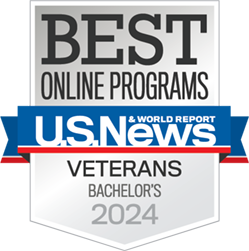
Developed with industry professionals.
100% Online
12 Months*
Note: We are not accepting applications at this time.
The George Washington University (GW) online Graduate Certificate in Regulatory Affairs is designed to teach working professionals the relevant, critical skills and knowledge they need to become regulatory affairs leaders in drug development.
Developed in collaboration with regulatory affairs professionals in federal agencies including the National Institutes for Health and Food and Drug Administration (FDA) regulations, this online regulatory affairs certificate integrates global regulatory strategy for drug development across the curriculum to equip you as a business leader in local and global regulatory strategies.
*The total number of credits and duration of the program depend on the number of transferred credits
To learn more about this online regulatory affairs certificate, or any of our other programs, you can register for our upcoming events.
Program Highlights
- 100% online, no visits to campus required
- The program requires 12 total credits and can be finished in 1 year
- Developed by regulatory affairs professionals working in governmental agencies such as the FDA and NIH
Program Outcomes
As a graduate of the online regulatory affairs certificate program, you'll be fully prepared to:
- Understand the framework necessary to develop an integrated understanding of regulatory affairs in areas such as drug development
- Demonstrate knowledge of drug development and evaluation of global regulatory strategies that support biological product development
- Examine the regulation of medical devices through an epidemiological lens, as advised by the FDA and NIH
- Understand topics such as protocol development, study design, post-marketing surveillance, evaluation, and assessment of regulatory submissions
Request Information
* Indicates required field
- Read: Privacy Disclaimer Acknowledgment
-
By submitting your contact information, you are providing your express consent authorizing GW and GW's representatives to contact you by email, phone, or text (including the use of an automatic dialing system). Standard text messaging and/or data rates may apply.
If you do not provide your contact information (phone and email), we may not be able to provide you with the information you requested.
If you provided your contact information but no longer wish to receive phone calls, emails, or text (SMS) messages from GW, you will have the option to opt-out. Emails and Text messages will include details for unsubscribing/opting out. To opt out of receiving phone calls from GW, contact us via email at info [at] hsprograms [dot] gwu [dot] edu (info[at]hsprograms[dot]gwu[dot]edu) or text/ call: 202-792-2819.
By submitting your information via this form, you also confirm that you have read and understood the GW Statement of Privacy Practices.
Note that the consent requested above is not required for enrollment in GW's programs. If you do not consent to providing the information requested on this form, you may contact us via email at info [at] hsprograms [dot] gwu [dot] edu (info[at]hsprograms[dot]gwu[dot]edu) or text/ call: 202-792-2819.
Accreditation and Rankings
- GW is accredited by the Middle States Commission on Higher Education
- #62 Best National University*
- #13 Best Online Bachelor's Programs*
- #7 Best Online Programs for Veterans*
* The U.S. News & World Report – 2024 Rankings



Curriculum
The online Graduate Certificate in Regulatory Affairs program is designed to meet FDA and NIH standards. The curriculum will provide the skills to advance your knowledge in clinical research, product testing, global health, public health policy, and drug development.
Who Is the Ideal Student for This Program?
The online regulatory affairs graduate certificate program is ideal for health care professionals who are either just entering the field of regulatory affairs or who wish to increase their knowledge and skills to advance to a leadership position. Students will explore the intricacies of drug development and prepare to meet FDA and NIH standards.
Career Outlook
Students of the online regulatory affairs graduate certificate program will learn to evaluate potential new products' scientific and economic value in the global market, championing effective deliveries of health care products locally and abroad.
By combining interdisciplinary practices of law, science, and business in regulatory affairs, this online regulatory affairs certificate prepares students for a variety of careers in regulatory affairs. Typical roles for regulatory affairs professionals include:
Regulatory Affairs Specialist: $70,333 median salary1
Regulatory affairs specialists develop local and global regulatory strategies for widely consumed products. They work directly with businesses and consumers to ensure the quality of products and food and drug development safety.
Regulatory Compliance Officer: $60,522 median salary2
Regulatory compliance officers ensure companies follow regulation laws for product and drug development. These professionals are essential for quality assurance and the safety of products.
Quality Manager: $82,752 median salary3
Quality managers work to detect problems or hazards within products developed by a company. These professionals are essential for food and drug development and protect consumers from faulty products.
Admission Requirements
To be accepted to this online regulatory affairs graduate certificate program, you must have:
- Completed application
- 3.0 GPA or above on a 4.0 scale
- Bachelor’s degree
- Resume/CV
- A written personal statement
- Two letters of recommendation
Tuition Details
The online Graduate Certificate in Regulatory Affairs program at GW consists of 12 credit hours. Please find the cost per credit hour and total estimated program costs here.
Note: Tuition rates are subject to change and additional fees may vary by program.
Meet the Program Director

GW’s experienced faculty provide you with the rich, practical knowledge and support needed for you to succeed in the program and in your career.
Kathleen Thoma, EdD, CCRP, CPH
- Full Bio
-
Dr. Thoma is the Program Director for the BSHS in Clinical Research Administration Program, the Dual Degree Clinical Research Administration Programs, and the Graduate Certificate in Clinical Research Administration Program. She is also the Assistant Program Director for the MSHS in Leadership and Strategy in Regulatory Affairs and Clinical Research Administration Program, and an Assistant Professor in the Department of Clinical Research and Leadership. She has over 20 years of experience in clinical research, health services research and educational research. Before coming to the George Washington University School of Medicine and Health Sciences, she was the director of research and a clinical research specialist at the University of Florida Center for HIV/AIDS Research, Education and Service (UF CARES) where she managed many NIH and industry-sponsored clinical trials during her tenure. Her particular expertise involved working with NIH-sponsored trials through the International Maternal Pediatric Adolescent AIDS Clinical Trials (IMPAACT) Network and the Pediatric HIV/AIDS Cohort Study (PHACS) network. She has also held positions as research project manager for the Pediatric Research in Office Settings (PROS) Network at the American Academy of Pediatrics, director of educational research at Florida State College at Jacksonville, and research project coordinator at the University of Illinois at Chicago’s College of Medicine/School of Public Health. She earned a doctorate in Educational Leadership with a cognate in Public Health from the University of North Florida. She is a Certified Clinical Research Professional (CCRP) through the Society of Clinical Research Associates (SOCRA) and holds the Certified in Public Health (CPH) credential from the National Board of Public Health Examiners. Her research interests include patient engagement and centricity in clinical trials, increasing diversity and inclusion in clinical trials, health literacy, health disparities and the social determinants of health, health equity, and distance education in the health sciences.
Sources:
- Payscale.com (25 January 2022) Regulatory Affairs Specialist Salary. Retrieved February 15, 2022
- Payscale.com (31 January 2022) Regulatory Compliance Officer Salary. Retrieved February 15, 2022
- Payscale.com (30 January 2022) Quality Manager Salary. Retrieved February 15, 2022
Curriculum Details
12 TOTAL CREDITS REQUIRED
The graduate certificate in Regulatory Affairs program (100% online) requires successful completion of 12 credit hours. You’ll explore topics such as the development of drugs and biologics, devices and diagnostics, clinical research in regulatory affairs, and regulatory compliance.
You can complete this graduate certificate in as little as 1 year.
Required Courses (6 credits)
- RCR 6201 Introduction to Global Regulatory Affairs and Clinical Research (3)
-
Foundation of regulatory affairs and clinical research in therapeutic development in U.S., EU and Japan. Roles in developing products, navigating the regulatory review and approval process, and maintaining products on the market.
- RAFF 6205 Regulatory Affairs Compliance (3)
-
Analysis and evaluation of regulatory affairs compliance strategies and guidelines. Pre and post marketing compliance of medical products, oversight, labeling, advertising and use. Prerequisite: RCR 6201.
Select One Course (3 credits)
- RCR 6202 Regulatory Strategy in the Development of Therapeutics (3)
-
Overview of therapeutic development through the analyses of the critical elements of the product lifecycle, assessment of non-clinical and clinical data, and integration of strategic business needs and post-marketing efforts in planning regulatory strategy. Prerequisite: RCR 6201.
- RAFF 6203 Regulatory Device Diagnostics (3)
-
Development and evaluation of the regulatory affairs strategies that support device and diagnostics development. Research science, study design, master file, risk/benefit analyses, product specifications and milestone identification, IDE, 510K, PMA. Prerequisites: RCR 6201.
Select One Course (3 credits)
- RAFF 6204 Clinical Research for Regulatory Affairs (3)
-
The planning and conduct of clinical trials. Topics include protocol development, study design, post-marketing surveillance, and evaluation and assessment of regulatory submissions. Strategies for achieving clinical development goals. Prerequisite: RCR 6201.
- RCR 6206 International Regulatory Affairs and Clinical Research (3)
-
This course explores international regulatory requirements for the development and approval of new pharmaceutical products around the world. Prerequisite: RCR 6201.
- RAFF 6207 Advertising and Promotion of Regulated Medical Products (3)
-
Exploration of FDA-regulated advertising and promotion of pharmaceutical drugs. Focus on pre- and post-market issues for prescription drugs and management of risks and compliance surrounding medical and commercial communications. Prerequisites: RCR 6201 and RCR 6202.
Key Dates
|
Summer 2025 |
Fall 2025 |
Spring 2026 |
|
| Application Deadline |
March 20, 2025 (Closed) |
July 20, 2025 (Applications not accepted) |
November 19, 2025 (Applications not accepted) |
Admissions Requirements
To be accepted to the graduate certificate in Regulatory Affairs program (100% online), you must have:
| Bachelor’s degree |
| 3.0 GPA or above on a 4.0 scale |
| Previous work experience. Health care experience preferred. |
| A written personal statement: Applicants must include a 250–500 word essay describing your reasons for undertaking study at GW, your academic objectives, career goals, and related qualifications including collegiate, professional, and community activities relevant to your program of interest. Include any substantial accomplishments not already mentioned on the application form. |
| Completed application |
| Resume/CV |
| Application fee: A non-refundable application fee of $80 is required. The application fee is waived for active-duty U.S. military, current GW students, degree-holding GW alumni, current McNair Program Scholars, and graduates of minority-serving institutions (MSI). |
|
Two letters of recommendation Letters of recommendation should be from:
Recommender will submit a letter on letterhead with a signature and credentials/contact information via the application portal. |
| Official transcripts from every college and university attended. All non-U.S. transcripts (including those in English) must be evaluated by an accredited foreign credential agency. Please find the list of member organizations here: https://www.naces.org/members. |
International Students
Effective Fall 2025
International students should check with individual programs regarding eligibility for visa sponsorship. Generally, online and hybrid programs are not eligible for student visa sponsorship from GW. This would include transfer students from any other institution with an existing visa. To be considered for admission, there are required scores that you will need to meet. Score requirements may differ by school and program so check the admissions requirements for your program.
Applicants who have not completed a post-secondary degree from an institution where English is the sole language of instruction are required to submit TOEFL, IELTS, PTE Academic, or the Duolingo English Test scores to be considered for admission. The following are the minimum scores for admission consideration:
- TOEFL: 600 on paper based, 250 on computer-based, or 100 Internet-based,
- PTE: overall score of 68,
- IELTS: an overall band score of 7.0, with no individual band score below 6.0
- DET overall score of 120.
Undergraduate applicants who meet one of the following conditions may be considered for admission without submitting TOEFL, PTE or IELTS or DET scores:
- You have earned an associate’s degree or higher from an institution where English is the sole language of instruction
- You are a citizen of an English-speaking country
Scores may not be more than two years old. To ensure TOEFL scores are sent to GW, use institutional code 5246. An institutional code is not required to send IELTS or PTE scores to GW. DET scores must be submitted via the Duolingo English Test system directly to GW.
Based on the results of your English Proficiency exam results and your application, you may be required to take English for Academic Purposes (EAP) during your first year of study at GW. Please note that GW evaluates each application holistically so applicants may still be recommended for EAP even if they meet the requirements for exemption. Students placed in EAP courses should anticipate additional tuition expenses as well as possible extension of time needed to complete their degree programs.
Official transcripts from institutions outside the U.S. must be accompanied by an official transcript evaluation from an accredited independent evaluating agency. Please be sure you request a detailed evaluation that includes all course titles, credit hours, grades, U.S. degree equivalency, grade-point averages (GPA), and date of degree conferral (course by course evaluation). For a list of acceptable foreign credential evaluation services, please visit NACES.
Supporting documents not submitted online should be mailed to:
Mail: George Washington University
ATTN: Transcript Processing Center
1415 W 22nd St.
Suite 220
Oak Brook, IL 60523
Alternatively, official electronic transcripts can be sent to: transcripts [at] hsprograms [dot] gwu [dot] edu (transcripts[at]hsprograms[dot]gwu[dot]edu)